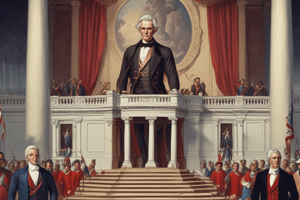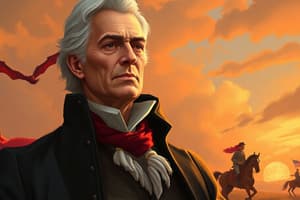Podcast
Questions and Answers
What was one of the key features of Andrew Jackson's presidency in terms of democracy?
What was one of the key features of Andrew Jackson's presidency in terms of democracy?
- Championing the Electoral Reform Act (correct)
- Supporting the aristocracy over the common man
- Seeking to expand the power of the federal government
- Implementing the Spoils System
What major event marked Jackson's second term in office?
What major event marked Jackson's second term in office?
- The Bank War
- The Battle of the Spoils (correct)
- The Nullification Crisis
- The Trail of Tears
Which tragic event is associated with Andrew Jackson's presidency?
Which tragic event is associated with Andrew Jackson's presidency?
- The Bank War
- The Trail of Tears (correct)
- The War of 1812
- The Nullification Crisis
What political challenge did Jackson face in his second term with key figures like Martin Van Buren and Richard Mentor Entwistle?
What political challenge did Jackson face in his second term with key figures like Martin Van Buren and Richard Mentor Entwistle?
Which act empowered the state legislatures during Andrew Jackson's presidency?
Which act empowered the state legislatures during Andrew Jackson's presidency?
In which situation did Andrew Jackson demonstrate his commitment to the common man?
In which situation did Andrew Jackson demonstrate his commitment to the common man?
What was the main reason behind Jackson's Indian Removal Act of 1830?
What was the main reason behind Jackson's Indian Removal Act of 1830?
What was the outcome of Jackson's veto of the bill for renewing the Second Bank of the United States charter in 1832?
What was the outcome of Jackson's veto of the bill for renewing the Second Bank of the United States charter in 1832?
Which of the following best describes Andrew Jackson's legacy as a president?
Which of the following best describes Andrew Jackson's legacy as a president?
What was the Nullification Crisis that occurred during Jackson's presidency?
What was the Nullification Crisis that occurred during Jackson's presidency?
How did Jackson's supporters view the closure of the Second Bank of the United States in 1836?
How did Jackson's supporters view the closure of the Second Bank of the United States in 1836?
Which action did Andrew Jackson take in response to the nullification crisis?
Which action did Andrew Jackson take in response to the nullification crisis?
Flashcards are hidden until you start studying
Study Notes
Andrew Jackson: A Comprehensive Look at His Presidency and Legacy
Andrew Jackson, the seventh President of the United States, left an indelible mark on American history through a complex and tumultuous presidency. His eight years in office saw both triumph and tragedy as he navigated a diverse array of issues, from the aftermath of the War of 1812 to the growing debate over slavery and Indigenous rights.
Presidency
Jackson's presidency was marked by a strong commitment to democratic reforms and a belief in the sovereignty of the common man. In his first term (1829-1833), he championed the Electoral Reform Act, which allowed more Americans to vote and expanded the franchise. He also worked to eliminate patronage jobs (spoils system) and empower state legislatures, leading to the formation of the Democratic Party.
Jackson secured his second term (1833-1837) through his hard-fought victory in the 1832 presidential election, known as the "Battle of the Spoils." His administration was marred by political infighting, particularly with Secretary of State Martin Van Buren and Vice President Richard Mentor Entwistle, both of whom were ousted from office.
Trail of Tears
One of the most tragic events in Jackson's presidency was the forced removal of Indigenous peoples from their land, collectively referred to as the Trail of Tears. Jackson's Indian Removal Act of 1830 led to the deportation of several Native American nations, including the Cherokee, Chickasaw, Choctaw, Creek, and Seminole. The relocation, often carried out in harsh conditions, resulted in the deaths of thousands. Jackson defended his actions, claiming that the land needed to be opened up for settlement, and the Indigenous people would ultimately benefit from the move.
Bank War
Another controversial aspect of Jackson's presidency was his hostility towards the Second Bank of the United States (BUS). Jackson believed that the bank, which was chartered in 1816, was a source of corruption and an impediment to economic growth. In 1832, he vetoed the bill for renewing the bank's charter, leading to the ensuing Bank War. The BUS was eventually forced to close its doors in 1836, and Jackson's supporters lauded the move as a victory for democracy and the common man.
Andrew Jackson's Legacy
Jackson's presidency has been both celebrated and criticized. His democratic reforms and championing of the common man have been celebrated as examples of American exceptionalism. However, his role in the Trail of Tears and Bank War has been widely criticized. Jackson's legacy has been a subject of ongoing debate, with historians grappling with the complexities of his presidency and the enduring impact of his actions.
Nullification Crisis
Jackson's presidency was also marked by the nullification crisis of 1832-1833, a constitutional crisis in which the state of South Carolina sought to nullify federal tariff legislation. Jackson responded with a forceful message of federalism, declaring that the tariff would be enforced and that nullification was unconstitutional. The crisis was ultimately resolved without bloodshed, but it highlighted the growing tension between the states and the federal government.
In conclusion, Andrew Jackson's presidency was a complex period in American history, marked by both triumph and tragedy. His democratic reforms and commitment to the common man have been celebrated as examples of American exceptionalism, but his role in the Trail of Tears and Bank War has been widely criticized. Jackson's legacy, like his presidency, remains a subject of ongoing debate among historians and scholars.
Studying That Suits You
Use AI to generate personalized quizzes and flashcards to suit your learning preferences.





